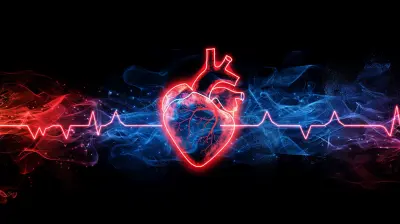Understanding and Balancing Your Body’s Energy Reserves
12 August 2025
Ever feel like you're running on empty before your day even begins? Like you’re constantly playing catch-up with your own energy levels? You’re not alone. So many of us struggle with fatigue, burnout, and that nagging sense that we just don’t have enough fuel in the tank to get through life. But here’s the good news—you have way more control over your energy than you think!
In this article, we’re going to dive deep into how your body stores energy, why you feel drained, and how to balance your energy reserves so you can live with more vitality, clarity, and strength. No complicated science—we’re breaking it down in a way that actually makes sense.
Let’s recharge, shall we?
What Are Your Body’s Energy Reserves Anyway?
Think of your body like a battery—yep, just like your phone. You start the day with a certain amount of charge and use it up through activities like thinking, walking, digesting food, dealing with stress, and even sleeping. Your body’s energy reserves are like the built-in power banks that fuel every single function you perform.Here are the three major types of energy reserves your body taps into:
1. Glycogen (Stored Carbohydrates) – This is your body's go-to, quick-release energy source. Kind of like caffeine—you get a rush, but it runs out fast.
2. Fat Reserves – These are your long-term energy stores. They release energy slowly and are great for endurance.
3. Muscle Protein (Last Resort) – Your body really doesn’t want to use this for energy, but it will if it thinks you’re starving. It’s like pawning your TV for grocery money.
Understanding how your body uses and stores energy is the first step to taking better care of your fuel supply.
Why You’re Always Tired (Hint: It’s Not Just Lack of Sleep)
Let’s be real—exhaustion feels like the new norm. But it’s not just poor sleep that’s draining your battery.Here are a few sneaky culprits chipping away at your energy reserves:
- Stress Overload – Mental stress burns through glycogen like a wildfire. Even if you’re sitting still, your brain’s working overtime.
- Poor Nutrition – You wouldn’t put soda in a race car, right? The wrong foods mess with your energy storage and release system.
- Lack of Movement – Ironically, not moving around can actually make you more tired. Your blood flow slows down, and energy doesn’t get distributed well.
- Dehydration – Even mild dehydration can make you feel foggy, weak, and grumpy.
- Inconsistent Sleep Patterns – Not just lack of sleep—but the quality and timing matter too. Without rhythm, your body can’t regulate energy properly.
If any of this sounds familiar, don’t worry—we’re about to walk through how to turn things around.
Signs Your Energy Reserves Are Out of Whack
Sometimes, your body tries to whisper before it screams. Here are some subtle (and not-so-subtle) signs that your fuel tank is running low:- You need caffeine just to feel “normal”.
- You feel wide awake at bedtime but exhausted in the morning.
- You’re short-tempered, anxious, or emotionally reactive.
- Physical tasks feel way harder than they used to.
- Your cravings go crazy, especially for sugar or carbs.
- Brain fog and constant forgetfulness set in.
These are your body’s warning lights, signaling that it’s time for a tune-up.
How to Rebuild and Balance Your Body’s Energy Reserves
Alright, time for the good stuff! Let’s break down how to genuinely restore your energy—not with quick fixes, but with sustainable habits that help your body thrive.1. Eat Like You Actually Love Your Body
Food is more than fuel—it’s information. It tells your body how to operate.- Prioritize Whole Foods – Think lean proteins, complex carbs (like quinoa, sweet potatoes, oats), healthy fats (avocados, nuts), and lots of colorful veggies.
- Balance Your Macros – Don’t fall for carb-phobia. Carbs are your body’s preferred energy source, just make them the good kind.
- Eat Consistently – Skipping meals or binge-eating throws your energy balance way off. Aim for regular, balanced meals.
- Hydrate Like It’s Your Job – Half your body weight in ounces per day is a good rule of thumb. Bonus points for adding electrolytes if you’re sweating or active.
Fuel wisely, and your body will reward you with more energy and better focus.
2. Move Your Body (Without Draining It)
Exercise isn’t just about burning calories—it's one of the most powerful ways to build energy.- Go for Daily Movement, Not Exhaustion – Walk, stretch, dance, lift—whatever lights you up.
- Strength Training Builds Resilience – It helps store glycogen more efficiently and preserves muscle so you don’t burn it for energy.
- Cardio Supports Circulation – Your energy can’t go where it needs to if your blood isn’t flowing properly.
Still think you’re too tired to exercise? Start small—even 10 minutes a day can start filling your tank.
3. Sleep Like Your Life Depends on It (Because It Does)
Sleep isn’t lazy—it’s essential maintenance work for your energy systems.- Stick to a Routine – Go to bed and wake up at roughly the same time every day (yes, even weekends).
- Limit Screens Before Bed – Blue light messes with melatonin production, making it harder to fall asleep.
- Create a Sleep Sanctuary – Cool room, blackout curtains, calming routines—whatever you need to feel cozy and safe.
When your sleep is solid, your energy naturally recharges overnight.
4. Master the Art of Rest and Recovery
There’s a big difference between doing nothing and intentional rest. Rest isn’t lazy—it’s smart.- Take Breaks During the Day – Step away from screens, go outside, breathe. You’re not a robot.
- Try Restorative Practices – Yoga, meditation, journaling, or just sitting in silence can reset your nervous system.
- Say “No” More Often – Your energy is precious. Protect it by setting boundaries.
You don’t have to earn rest. You deserve it—just for being human.
5. Manage Stress Like a Pro (Not a Martyr)
High stress levels drain energy faster than almost anything else. But you can take back control using a few key practices:- Breathe Deeply – Inhale for 4 seconds, exhale for 8. It slows your heart rate and calms your brain.
- Laugh and Connect – Social support and humor are natural energy boosters.
- Plan Downtime – Don’t wait until burnout hits. Schedule time to do nothing.
Stress happens, but how you respond to it shapes the way your body uses energy.
The Mind-Body Energy Connection
Let’s not forget—your thoughts, emotions, and intentions are energy too. Ever notice how a day full of negative thoughts drains you more than a full workout does?Here’s how to energize from the inside out:
- Practice Gratitude – It rewires your brain to focus on abundance.
- Visualize Success – Your brain doesn't know the difference between real and imagined success. Use that!
- Take Ownership – You’re not helpless. You have the power to make changes, one decision at a time.
Energy isn't just physical, it's deeply emotional and spiritual too.
Final Thoughts: You're Not Broken—You're Just Tired
Let’s be honest—the world glorifies hustle and punishes rest. But you weren’t meant to run on fumes. You were built to thrive, not just survive.Balancing your body’s energy reserves isn’t about being perfect—it’s about tuning in, paying attention, and offering yourself the same care you give to others. You already have everything you need inside you to feel better, stronger, and more alive.
Start small. Choose one or two things from this list and build from there. You don’t need to overhaul your life in a weekend. Gentle shifts lead to powerful change.
Remember, your energy is your life force. Protect it like gold.
Quick Recap: How to Rebalance Your Body’s Energy Reserves
- Fuel your body with whole, balanced meals and hydration.- Move daily, even in small ways.
- Prioritize quality sleep and consistent bedtimes.
- Make rest part of your routine (not an afterthought).
- Manage stress with boundaries, breathing, and recovery.
- Nourish your mindset with gratitude and positive visualization.
Little by little, you’ll feel the shift—from drained and depleted to vibrant and empowered.
You’ve got this 💪.
all images in this post were generated using AI tools
Category:
Energy BoostAuthor:

Arthur McKeever
Discussion
rate this article
1 comments
Issac Hamilton
This article piques my curiosity about how our daily habits influence energy levels! I'm eager to learn more about effective strategies for balancing energy reserves. What specific practices can help optimize our vitality?
August 22, 2025 at 3:58 PM

Arthur McKeever
I'm glad to hear you're interested! Some effective practices to optimize vitality include maintaining a balanced diet, regular physical activity, staying hydrated, getting adequate sleep, and incorporating stress management techniques like mindfulness or meditation.


